| Welcome | |
| Professor Graham Galbraith | Deputy Vice Chancellor, University of Hertfordshire |
| Chair | |
| Sir William Francis | Past President of the Institution of Civil Engineers, UK. |
| Speakers | |
| Hugh Hoather | President, The Chartered Institution of Waste Management |
| Colin Rowland | Hampshire County Council |
| Allan Barton | Director, Leader Resource and Waste Management, ARUPE |
| Vote of Thanks | |
| Linda Scott | Chief Executive, Arkwright Scholarships Trust |
| Synopsis |
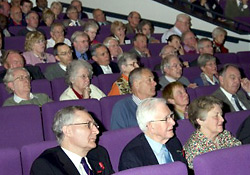
Audience
The eleventh annual prestige seminar organised by the East of England Engineering Science & Technology Association (Herts and Beds Group) with support from many Professional Engineering Institutions and IOP took place on the evening of Wednesday 11th November 2009. This free event hosted by the University of Hertfordshire commenced with refreshments and networking in an informal environment.
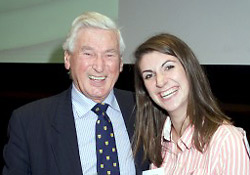
Sir William Francis and EEESTA Award Winner, Alexis Storey
The Seminar was opened with a welcome address from Professor Graham Galbraith, Deputy Vice Chancellor, University of Hertfordshire.
The Chairman was billed as Dr Alan Whitehead, MP, but he had to step down because of a Three Line Whip. His place was ably taken by Sir William Francis, Past President of the Institution of Civil Engineers, UK. Sir William had the pleasant task of presenting the EEESTA Award to Alexis Storey, an Outstanding Arkwright Scholar in her final year at Haberdashers’ Aske’s School for Girls, Elstree. Alexis made a short thank you address in which she described her interesting work experience and how that had inspired her to study Engineering.
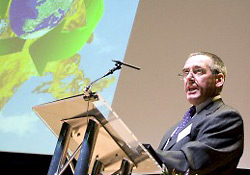
Hugh Hoather
Sir William then introduced the first speaker, Hugh Hoather, President, The Chartered Institution of Waste Management, whose talk “Magnitude – How can this be reduced?” set the scene.
Without visual aids, he pointed out that the UK geology favours land fill, but recently the pace of change had been relentless, particularly in the light of the European Directive on Waste. The objectives are broadening because of the need to address global warming.
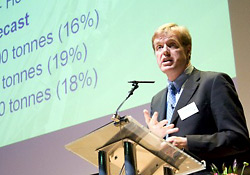
Colin Rowland
The second paper given by Colin Rowland, Head of Waste Strategy Implementation, Hants CC, was titled “Landfill Diversion, Resource Efficiency and Decentralised Energy”.
He claimed that Hampshire was at the forefront of waste management advances, having three energy recovery sites and two material recovery sites.
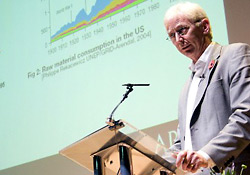
Allan Barton
In the final paper, “Engineering solutions to waste management”, Allan Barton, Director, Leader Resource and Waste Management, ARUP, described various techniques for energy and material recovery including Pyrolosis, Incineration and Composting.
He showed a number of diagrams of the equipment he was describing, but they were too detailed to be appreciated by the audience. He was at pains to point out the various techniques to scrub the exhaust gasses to minimize toxins and particulates escaping into the atmosphere.
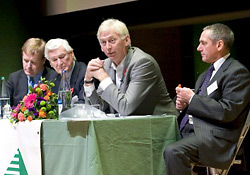
Question Time
The lively question time was nearly high jacked by a delegate who argued strongly against any incineration because of the risk of generating dioxins. Interestingly the EEESTA Award winner, Alexis Storey, pointed out that there was risk associated with every solution, even just using land fill.
The Vote of Thanks was given by Linda Scott, Chief Executive, Arkwright Scholarships Trust. She noted that the seminar had fulfilled EEESTA’s objective to promote the engineering, science and technology professions to the community at large.
Photographs on this page by Will Dennehy Photography. Text by Ian Williamson.
